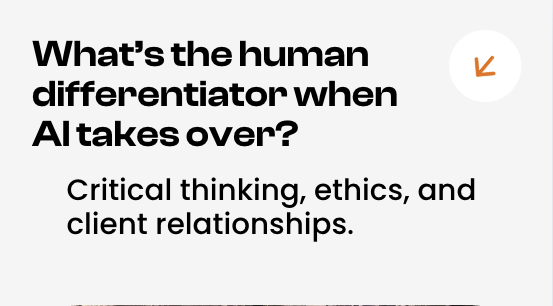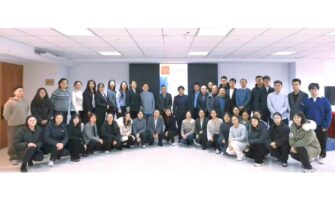28/10/2025
This leadership session confirmed what we already knew about AI but refuse to admit
Technology
Jonathan was telling me about a presentation at their recent Hillier Hopkins partners’ meeting. I think it’s worth sharing what he told me with you here.
The coffee was still warm when Paul from Excited By Digital started speaking. You could tell he was excited—it’s literally in his company name. He was there to tell us about AI in accounting, “the potential gains for a firm of our size but also the pitfalls as well.”
Most consultants sell you the dream without mentioning you might wake up unemployed and this session had two key objectives. “How to help you as a leadership team to frame your shared approach to AI—what do we want to do more of?”
So now I’m thinking, what do we want to do more of in TGS, or what can we do more of now that AI is doing everything else, or how can we use the robots more effectively to do what we do quicker?
The second topic is even more chilling. “The role of leaders in communicating what AI will mean to our firm.”
Not if AI will transform the firm. Not whether we should adopt it. But how we tell people it’s happening. The decision, apparently, has already been made.
The uncomfortable summary
The session generated a paper—well, AI generated a paper: appropriately meta. It was 2,000 words and 20 pages long. Even AI hasn’t learned that brevity is the soul of wit, they used Co-pilot to streamline it down to a five-minute read.
Even the efficiency tools need efficiency tools now.
The summary was organized into themes that should sound familiar to you: Empowering People, Automating Tasks, Delivering Services Differently, and Navigating External Disruption.
Empowering People means:
“AI will do the boring work, freeing you up for higher-value advisory.” Which sounds wonderful until you realize that what we’ve been calling “advisory” is often just slow compliance work billed at a premium. AI as a co-pilot handles repetitive work, the document claimed, freeing accountants to focus on “higher-value advisory and creative problem-solving.”
But how many accountants got into accounting because they wanted to do creative problem-solving? Often they became accountants precisely because they like repetitive work with clear right answers.
The document acknowledged what everyone fears: “Upskilling is essential—junior staff are keen adopters, but there’s a generational gap with senior leaders less confident in AI.” This translates as, the people who need to drive adoption are the least equipped to do it, and the people who understand it have no power to implement it.
There was a curious line buried in there: “With AI doing the grunt work, the human differentiator becomes critical thinking, ethics, and client relationships.”
This is where it gets uncomfortable. Because for years, we’ve been telling clients they need us for our technical expertise. Our knowledge of tax law. Our understanding of accounting standards. Our ability to reconcile their books and prepare their returns.
All of which AI can now do faster, more accurately, and without complaining about the client who submits everything in shoeboxes.
What’s left? “Critical thinking (for now), lateral thinking, ethics, and client relationships.”
In other words: being human.
I think Dr Eve Poole hit the nail on the head a few years ago and I’d recommend reading “Robot Souls” again.
Automating tasks (Or: Why we’re all worried)
The presenter cheerfully noted that “AI is already automating data entry, reconciliations, and compliance checks, improving accuracy and freeing up staff for more strategic work.”
Everyone in the room nodded and everyone in the room was thinking: “More strategic work” is a euphemism for “we need fewer people.”
The risks section was more honest than expected: “Automation bias (over-trusting AI), integration complexity, and workforce impact (changing roles, potential morale issues).”
Potential morale issues. That’s one way to describe realizing your entire skillset might be automated away before you make partner.
The Big Four have billions to spend on this transition. They can afford to get it wrong a few times. They can hire people whose only job is thinking about AI strategy.
Mid-tier firms? We’re trying to figure out if we can afford another partner while also wondering if AI means we’ll need fewer partners in five years.
Delivering services differently (Be afraid! Be ver-AI afraid!)
This section talked about “AI-enhanced advisory” enabling “real-time insights, predictive analytics, and scenario planning—moving from hindsight to foresight.” Which is lovely, except that’s the exact service we’ve been trying to upsell to clients for years. The premium advisory work that was supposed to be our future and now AI does it automatically.
The document suggested “potential for continuous, personalised services (e.g., real-time dashboards, virtual CFO assistants), and new revenue streams (e.g., AI advisory for clients).”
Read that last bit again: “AI advisory for clients.”
We’re going to advise clients on how to use the same AI that’s making our traditional services obsolete. It’s like tobacco companies pivoting to selling smoking cessation aids.
The risk section was almost poetic: “Maintaining the ‘human touch’ and trust, ensuring quality and compliance of AI-generated advice, and avoiding commoditisation as AI tools become widespread.”
Avoiding commoditization. That ship hasn’t just sailed—it’s been automated, optimized, and is now being piloted by an algorithm.
Navigating external disruption (Also known as: We’re All Doomed)
“AI is lowering barriers to entry—tech firms and new players could bypass traditional accountants. Big Four are investing billions; clients are demanding more for less.”
There it is. The thing nobody wanted to say in the meeting but everyone was thinking. We’re not competing with other accounting firms anymore, we’re competing with tech companies who don’t care about tradition or professional standards or the sanctity of the partnership model.
They care about scale, efficiency, and giving clients what they want: cheaper, faster, better.
The document noted: “Clients expect to share in AI-driven efficiency gains (e.g., PwC clients asking for discounts). Traditional billing models may be challenged.”
May be challenged. That’s wonderfully optimistic.
Traditional billing models are already being challenged. They’re being challenged by clients who can see that what took us three days now takes AI three hours. They’re being challenged by tech platforms offering subscription-based accounting services for less than our hourly rate.
They’re being challenged by reality.
The Three Strategic Postures
The document concluded with three options for firms like ours:
- Fast Follower: Quickly adopt proven AI innovations, learning from early adopters
- Client Co-Pilot: Use AI in partnership with clients, embedding it in the client experience
- Sector Specialist & Innovator: Focus AI efforts on niche sectors where the firm has deep expertise
These are presented as choices. But really, they’re stages of grief.
Fast Follower is denial—pretending we can watch what the Big Four do and then copy it on a budget.
Client Co-Pilot is bargaining—maybe if we involve clients in the process, they won’t notice we’re automating ourselves out of relevance.
Sector Specialist is acceptance—we can’t compete everywhere, so let’s find a niche and hope AI doesn’t learn that too. You’ll think more about this niche option from Siong Yoong in our Bangkok event.
AI is happening now. The firms that thrive will be those that deliberately shape their AI strategy, invest in people, and stay true to their core values while embracing change.
It’s a stirring conclusion. Very leadership-y and very strategic.
But staying true to core values while embracing change is incredibly difficult when the change fundamentally undermines the value proposition those values were built on. Our core value has always been expertise, technical knowledge and years of training and experience. The judgment that comes from having seen thousands of businesses, hundreds of tax returns, decades of economic cycles.
AI doesn’t need decades. It needs data and there’s a lot more data than there are decades.
Nobody asked this…
At the end of the session, there was the usual Q&A. People asked practical questions about implementation timelines and training programs and which tools we should be looking at.
Nobody asked this: If AI can do the technical work, and we’re pivoting to being advisors, what happens when clients realize they don’t actually need advice—they need someone to implement what the AI already told them to do?
Maybe the firms that thrive won’t be the ones that invest heavily in AI. Maybe they’ll be the ones who figure out how to make humans valuable again.
Alberto from TGS member firm Athena Law in Italy will be leading a session on this in our Bangkok event.
Want to know what we're actually doing about this?
The real conversation isn’t happening in leadership sessions—it’s happening among practitioners who’ve stopped pretending and started adapting.




